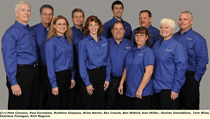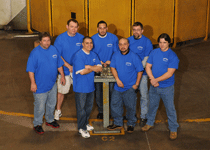Spotlight on Remcon Plastics: Lean journey leads to fat rewards
Rotomolding processor Remcon began its Lean Manufacturing journey in the 1990s, but really kicked it into high gear about five years ago. Now, with Lean part of the company's culture, the benefits are really starting to hit Remcon's bottom line.
April 14, 2011
Rotomolding processor Remcon began its Lean Manufacturing journey in the 1990s, but really kicked it into high gear about five years ago. Now, with Lean part of the company's culture, the benefits are really starting to hit Remcon's bottom line.
Remcon CEO and owner Pete Connors knew he wanted to improve his company's manufacturing processes, but also recognized he needed help. "I recognized that nothing was going to happen until I had an expert on this in my staff," he says. He got Remcon's Lean ball rolling by hiring Rich Maguire, his COO, who started his own "Lean journey" while working at high-end furniture manufacturer Herman Miller. That company learned what it knows about Lean from Toyota, and the experts at the car OEM now point to Herman Miller as a poster child for Lean done properly.
|
|
Remcon's entire team helps it navigate the Lean journey, from the management and office workers (top) to the team leaders on the processing floor. |
Maguire recalls that he spent his first two years at Remcon establishing a "Lean culture" among the employees, and picking some of the low-hanging fruit in terms of projects. Founded in 1982 with one rotomolding machine and two employees, Remcon now employs 75-80.
Maguire explains, "In any Lean transformation, first you need stability in your process, your people and your equipment." When Maguire came onboard, that wasn't the case; Remcon's scrap percentages were between 6-7%. "Now it's usually under 1.5%, and often less than 0.5%," says Connors. According to independent benchmarking done for the processor, "Really good rotomolders have scrap rates of about 3.5%," adds Maguire.
Maguire helped instill a culture of excellence at the processor. "People look at Kaizen events and think that's what Lean is all about. But really it needs to be the everyday improvements," he explains. Important also is not just fixing a problem but making the time and effort to analyze why it occurred. "Action without understanding is meaningless," comments Maguire. "Rich had the team look at root cause analysis, " recalls Connors. Like many processors, he recalls, "We'd respond to a problem quickly, but didn't look at why a problem occurred." As employees grow accustomed to looking at problems and drilling down to find solutions, Maguire is adding another piece to the Lean puzzle: grading the solutions on how well they worked.
Connors credits Maguire with getting all of the staff moving in accord. "Rich has done a great job coaching our plant managers and supervisors," he says. Maguire is not claiming the work is finished but says, "We're transitioning to a truly thinking organization." Sometimes simple steps add up to greatly increased productivity, such as building shadow boards for tools to cut down on time spent searching. That was one of the first steps introduced, but employees quickly realized that smaller shadow boards at each employee's workstation made even more sense.
Consider how far you've traveled
"You can get really depressed because your goal keeps moving" as your production grows ever more efficient, admits Connors, but adds the key is looking at where you started to see how much progress you've made. Remcon can claim new customers, new projects and "found" capacity as a result of its efforts. One application, for example, was taken over by Remcon from another rotomolder. "At first we were molding 9-10 parts per day with about 8-9 people per shift," recalls Connors. "Now it's four people per shift, making 18 per day. And the four people there are working less hard than when we had nine on the job."
Maguire says the company has won new customers as a result of its Lean efforts. With some it even has established a relationship so that its savings benefit both parties, and increasingly Remcon is being asked to visit its customers' shops to help them improve their own efficiencies. "We've gotten much more involved in their operations," says Connors.
Last year the company hired Ben Wittich to champion its Lean coordination. Maguire tasked him to establish a continuous improvement team, with members rotating into and out of the group after each event. With Lean taking hold throughout the company's production floor, the next step is implementing the same sort of procedures in Remcon's offices.
Beyond all of the investment in the company, Remcon and Connors have not overlooked investing in the community. The company is a top sponsor of the Mustang Scholars program at nearby Valley Forge Military Academy. The program funds selected economically and socially disadvantaged young people's education and helps steer them on a positive path in life. "We give them a commission (as a military officer), a degree, give kids a chance who otherwise might not get one...it's money very well invested," explains Connors. Much like the company's Lean efforts, the output far outstrips the input.
One of Remcon's custom products is a locker. In the past, recalls Maguire, the company had made these in a "batch and queue" process, with batches rotomolded, then doors and other parts made, and finally all of the components brought together for assembly. "We didn't discover any problems until it was too late, plus we had inventory sitting around," explains Connors. Now, the same lockers are made in a 1-piece flow process. "The sooner a parties turned into finished goods, the faster you can sell it, you improve your cash flow and cut waste," says Maguire, adding, "It's a simple thought process, but it's not easy to implement. It takes a lot of work."
About the Author(s)
You May Also Like




